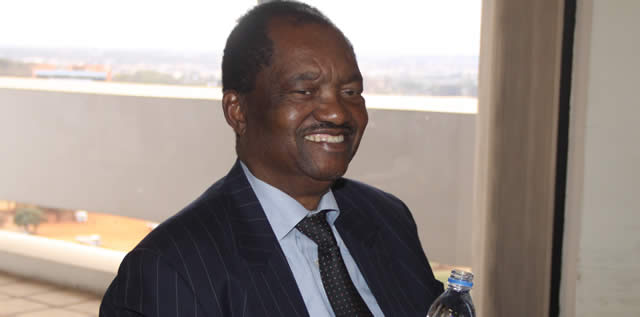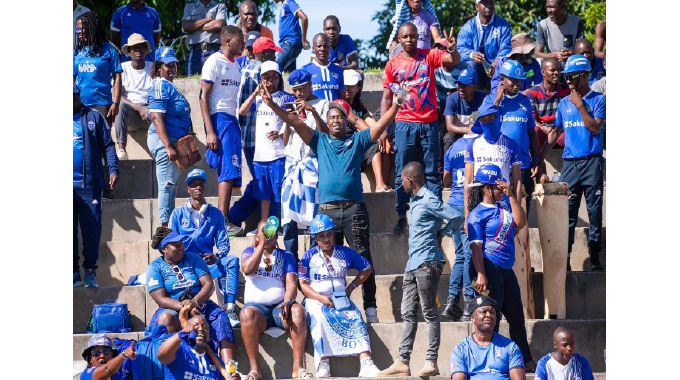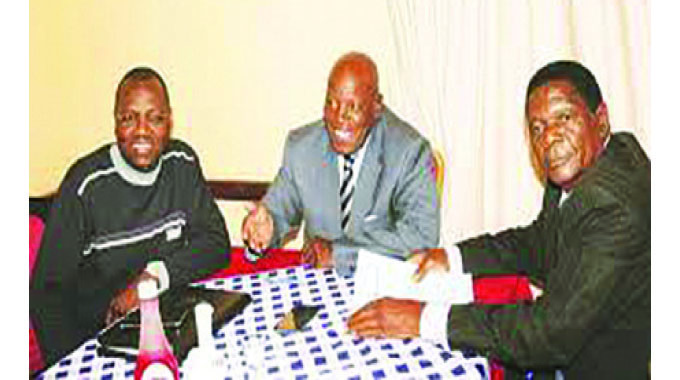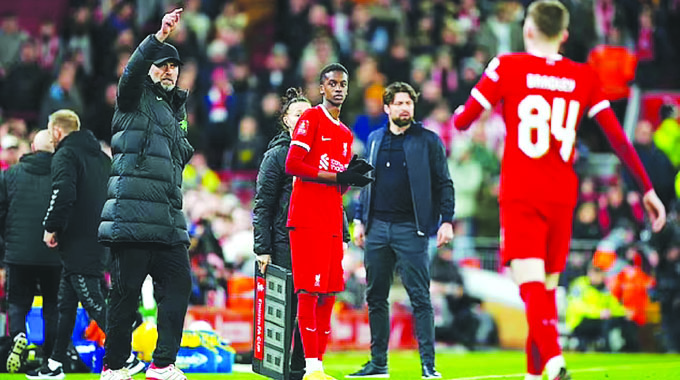Why hosting the 2017 Nations Cup is good, and might also be very bad, for us
SIXTEEN years ago, I spent a month in Burkina Faso, a country that had been battered by successive droughts and military coups, ranked by the United Nations then as the third poorest nation in the world, where more than 85.2 percent of the population lived in grinding poverty.The stifling heat, the chaos on the dirty streets of Ouagadougou where there were more noisy motorcycles than the run-down cars, the apparent disorder in a city whose town planning had long collapsed, and the sand storms that battered it, were all a unique experience.
It was my maiden assignment covering the Nations Cup finals and, that month, more than anything else I have experienced in my life, provided a defining experience that brought to the fore the awesome power of the game called football.
A few years earlier, back home, the Dream Team had united my country like no other team before, and after, with 60 000 filling the National Sports Stadium at every home game, scores following them on their travels, new football converts being recorded every day around Zimbabwe and Reinhard Fabisch transforming himself into an iconic figure so popular they still talk about him at our stadiums.
But not even that could prepare me for what I saw in Burkina Faso, during that unforgettable month, as the power of football made this hopelessly poor nation forget about its challenges, made its people find pride in their identity as Burkinabe and, for that month alone, paraded themselves as the greatest people in this world.
And, with each success story written by their gallant Stallions, who went all the way to the semi-finals of that Nations Cup, the people of Burkina Faso found another reason to flaunt their newly-found pride, as the greatest nation in the world, and together — the people and their national team — they basked in the spotlight provided by Africa’s premier football tournament.
A ravaging drought that had hit the country with severe consequences, the previous year, was forgotten in the flood of happiness that swept across this country as the Burkinabe basked in the honour of successfully hosting the Nations Cup and the glory that the success of the Stallions brought to their nation.
The political tensions, which had gripped the country the previous year, brought by the 10th anniversary of the assassination of President Thomas Sankara, in a coup that swept President Blaise Campaore to power in 1987, drowned in the euphoria that swept across this West African nation as it celebrated its time in the spotlight brought about by the hosting of the ’98 Nations Cup finals.
Every day, which passed, I fell in love with the Burkinabe, blown away by their love for one another, something that had been cemented by the arrival of the Nations Cup bandwagon in their backyard, I envied their united front, their camaraderie, their love for their country, despite the fact that it was ranked the third poorest in the world, and their pride in who they were, despite their awful living conditions.
For a whole month I lived with them, dined with them, watched the football with them, joined them in supporting their Stallions, celebrated with them when they won their big battles all the way to the semi-finals, felt their disappointment when the journey came to an end, understood their emotions when I saw them crying and joined them in cursing the football gods that it had all ended prematurely but, all the same, acknowledging that their national team had punched above their weight.
Football had made their nation, brought together the different parties, healed the gashing wounds, helped them forget their grinding poverty, made them so proud in their identity as Burkinabe, made them fall in love with their Stallions, and there was a refreshing wave of goodwill that was sweeping across the entire country, during the course of their hosting of the ’98 Nations Cup finals, and everyone was absolutely happy.
I had arrived in Burkina Faso on February 4 ’98, unsure of what I was plunging myself into for an entire month, wondering how I would spend 30 days in this country that the world appeared to have forgotten, but I have to make it clear that, by the time I arrived at Ouagadougou International Airport for my flight back home, there was this overwhelming feeling of sadness, that I was leaving these good people behind.
WHY HOSTING THE NATIONS CUP IS GOOD FOR US
Zifa chief executive, Jonathan Mashingaidze, on Tuesday submitted our latest bid to host a Nations Cup finals, something that we came very close to doing at the turn of the millennium before football politics destroyed our dream, and something that the association and the ministries of Sport and Tourism believe can be done in three years time.
Given the way our football is severely fractured right now, plagued by warring factions that just won’t go away, frozen by a leadership that has gone into hiding since they won the elections and the right to lead the national game, weighed down by ballooning debts that might never be paid off, stalked by a stench of negativity that just won’t go away, it’s safe to suggest that hosting the 2017 Nations Cup could just bring something to cheer the game’s haunted spirits.
It’s hard to believe that we elected a new Zifa board member, in charge of the association’s finances, six months ago, because Ben Gwarada, a very successful young businessman in his own right, appears to have been frozen out of a system where he was hopeful he was going to make a huge impact once he came on board.
If he hasn’t been given the freedom to run the association’s finances the way he feels is the right way, the way he has run his companies and turned them into success stories, then why should we expect him to make a difference at ZIFA?
Maybe, against that background, it explains why nothing has changed at the association, despite the arrival of a number of new faces in its leadership structures, and yesterday we had the unfortunate scenario where all the furniture that was in the Zifa Village, which was being used by national teams that camped there, was attached by the Messenger of Court because of a non-payment of a debt.
How do we expect an association, which freezes out its board member in charge of finances, to start the tough process of clearing its debts, balancing its books, negotiating with the creditors and ensuring that something as ugly as what happened at the Zifa Village yesterday is avoided?
Hosting the 2017 Nations Cup, of course, will change everything because the board member in charge of finance has to play the role that he was elected for, it’s something that the Government, CAF and other partners will insist on, because they don’t compromise on corporate governance, and we will eventually see a ZIFA executive acting as a united board and not as a fractured organisation.
The foundation of the bidding process for the hosting of the 2017 Nations Cup might not have been built by a united Zifa leadership, we have seen the letters that have been circulating that show that other board members only learnt about this bid when a decision had already been reached, when emissaries had been sent to Zambia to ask them to come on board as co-hosts.
But there is no doubt that winning the 2017 Nations Cup will unite our football leaders because there is no other way that they can manage to successfully host the tournament without pulling in one direction, working as a team, since this is a national assignment that cannot be executed by one man, or two men, as appears to be the operational model at the association today.
Winning the bid to host the 2017 Nations Cup finals will help our football leaders appreciate, for a change, the importance of having a competitive national team that, just like the Stallions in Burkina Faso 16 years ago, can fly the national flag proudly, carrying the weight of a nation that demands that they become a successful unit, and after what we have seen in the past four years, this will represent a huge leap in the right direction.
There will be incredible pressure on the Zifa board to assemble a team that can do very well, something that you don’t see in their DNA right now, because if our football leaders were serious about rebuilding the Warriors, surely, the first starting point would be on identifying a coach, whose job would be solely to work on the team, rather than this comic arrangement where they appoint Callisto Pasuwa as the man who can be in charge of that process.
It’s not that Pasuwa is a bad coach, his three straight league championships with Dynamos sends the signal that he is a good gaffer even though his struggles, with the same team on the continent in the past three years, suggest that he has more to learn, more to do, before he can be the man that an entire nation can put its hopes on to spearhead the resuscitation of its national football team.
Pasuwa’s problems, in as far as his national assignment is concerned, is not about what he lacks, in terms of his technical capacity, but the fact that, as coach of the biggest football team in the country, where every day and every night he is under pressure to find ways of taking this team forward, where the spotlight is intense, where failure is not an option, where winning three straight league titles doesn’t turn you into a legend, he has so much on his plate it just doesn’t look right to dump a lot more on his table.
It’s safe to suggest that there is more pressure, today, in coaching Dynamos than in coaching the Young Warriors or even the Warriors and why the association believes that a man, who has such a heavy load at DeMbare, should be the one who should carry the responsibility of assembling the next generation of the Warriors, defies all logic.
Yes, Zifa have no money but if we are serious that we want to assemble a national team that can do well, in terms of representing us, when our next Nations Cup journey begins, then we have to do more than just looking at what we can afford, after all we never paid Ian Gorowa for six months, and at least he didn’t have the baggage of having to worry about coaching the biggest football team this country has ever seen.
When Zifa gave Fabisch the responsibility to build a strong Warriors’ team, beginning with the Olympic Games team which was at the 1991 All-Africa Games in Cairo, Egypt, he had the freedom because that’s all he was doing and it’s no surprise that he built a strong Dream Team, something he would not have done if he had the dual role of coaching Dynamos or Highlanders.
I believe that winning the right to host the 2017 Nations Cup finals will thrust Zifa under pressure, to take a serious approach in terms of building the team that will represent the nation in its backyard, and their kamikaze approach, where they even choose the man with the biggest work load, in terms of coaches on our club scene, to lead that revolution, will be a thing of the past, unmasked as the sick comedy that it is.
Then there is the issue of the people of this country finding each other, just like what the Burkinabe did 16 years ago, finding pride in our identity as Zimbabweans, finding unity in our shared responsibility of supporting our Warriors in their backyard, finding the passion to all play a part in ensuring that we are remembered as successful hosts, which is all priceless.
WHY HOSTING THE 2017 NATIONS CUP FINALS MIGHT BE BAD FOR US
Knowledge Musona last played for the Warriors in a Nations Cup tie on June 17, 2012, when he scored the only goal against Burundi at the National Sports Stadium.
If we win the bid to host the 2017 Nations Cup finals, it means that Musona, who for the past four years has represented our best hope when it comes to this game, will spend five years without playing a Nations Cup tie.
He was 22, when he played his last Nations Cup tie for his country, he will be 27 by the time he plays in this tournament again if we win the right to host the 2017 Nations Cup finals.
That means Musona would have lost five of his best years, in this game, without playing in the Nations Cup and that is certainly not good, for his career, and even for us as a nation that will certainly be banking on him to lead our line.
Khama Billiat played for the Warriors in a Nations Cup assignment on October 15, 2012, when he ended up in tears, after our heartbreaking loss to Angola in Luanda, and needing the assistance of Peter Ndlovu and Gerald Maguranyanga to help him walk off the stadium.
He had just turned 22 that day.
If we win the bid to host the 2017 Nations Cup finals, it means Billiat, who in the past four years has been our second best player, in terms of the national team to Musona, will be 27 by the time that he plunges into another Nations Cup assignment.
Again, that is not good for his international career, and it won’t be good for us as a nation banking its hopes on a player who has been missing from the jungles of African football for five years.
Willard Katsande, whose absence in the first leg of our qualifier this year triggered a nationwide uproar and who scored in our last Nations Cup game, would be 31, and having missed three years of Nations Cup football, by the time we host the 2017 Nations Cup finals.
In terms of team building, winning the bid to host the 2017 Nations Cup finals doesn’t help us, because a lot of our key players will lose a lot of time from the jungles of African football, and expecting them to then explode, under the pressure of the home crowd, would be a big gamble.
We haven’t done very well, in terms of trying to qualify for the showcase, but it’s something that we probably need to do all over again, rather than just get a place on a silver platter as hosts, when chances are high that we would be a disgrace in our backyard.
DID WE MISS SOMETHING IN THIS CAF 2017 NATIONS CUP CIRCULAR?
I have been looking at the circular sent by CAF secretary-general, Hicham El Amrani, inviting African countries to bid for the 2017 Nations Cup and, every time I read it, especially the final paragraph, I feel that there is something that we missed:
“IN ADDITION TO THE GOVERNMENT GUARANTEE, AND CONSIDERING THE LIMITED TIME LEFT FOR THE ORGANISATION OF THE 2017 EDITION, THE CAF EXECUTIVE COMMITTEE WILL SELECT A HOST COUNTRY WHOSE DOSSIER GUARANTEES ACCOMMODATION, TRANSPORT AND HOTEL FACILITIES, AS WELL AS TRAINING SITES AND STADIUMS THAT ALREADY EXIST,” wrote El Amrani.
Clearly, CAF here say that they will only consider those countries which have stadiums “ready” to host the Nations Cup finals.
We have three stadiums, which means that we fall short of the minimum four required, and they are all not ready to host the tournament and we can’t argue that we will have to build another stadium because, according to the circular, that is out of order.
Maybe, I might be wrong, but I think CAF were clear here.
THE ENGLISH PREMIERSHIP IS NOW A COUNTER-ATTRACTION
The NetOne OneWallet Cup Final is the big game this weekend but I feel that our football leaders would have done a better job by fixturing it to be played today rather than tomorrow for the sake of attracting the biggest possible crowd to the National Sports Stadium.
It’s about time that we consider the English Premiership as a counter-attraction and Chelsea versus Arsenal, starting at about the same time as the Dynamos versus Triangle game, has the capacity to keep about 5 000-plus fans at home or in the bars.
There is also the small issue of Manchester United versus Everton tomorrow, starting just before the game at the National Sports Stadium, and that’s another 5 000-plus fans deciding to stay at home or in the bars.
The sooner we organise our big matches, with the English Premiership in mind, the better we are likely to have more fans coming to our domestic ties.
Just a thought!
To God Be The Glory!
Come on United!!!!!!!!!!!!!!!!!!!!!!!!!!!!!!!
Di Mariaaaaaaaaaaaaaaaaaaaaaaaa!
Text Feedback — 0772545199
WhatsApp Messenger – 0772545199
Email — [email protected]
Skype — sharuko58
Like my new Facebook page, ROBSON SHARUKO JOURNALIST, follow me on Twitter @Chakariboy, interact with me on Viber and on ZBC’s weekly television football magazine programme, GamePlan on Monday nights, or read my material in The Southern Times.









Comments